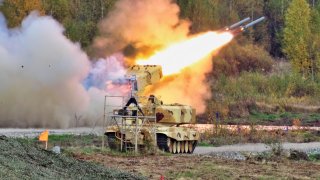Why Russia Supports the Houthis
If Russia is now on a path to no longer be a principal agenda-setting country, then Moscow needs a more disruptive strategy where globalization has fractured and where U.S. effort and attention are pulled in multiple, different directions.
Since the restart of major Russian combat operations in Ukraine two and a half years ago, the United States and its NATO allies have maintained the position that the provision of military equipment to Ukraine, the training of Ukrainian forces (both outside of Ukraine as well as in-country) and the provision of intelligence and technical assistance to enable Ukraine to utilize different defensive systems has not and does not constitute Western involvement in the conflict.
The Western alliance has resolutely maintained the stance that, as a result, any deliberate overt and confirmed Russian targeting of NATO countries (as opposed to accidental overflights) would constitute an armed attack. Indeed, even when Ukraine successfully carried the fight to the Russians both in their rear echelons and in the maritime domain, Russia has apparently been sufficiently deterred to limit its responses to largely diplomatic protests. Indeed, some Western advocates of even greater Western assistance to Ukraine argue that Russia's deterrent threats represent nothing more than a paper tiger.
The problem, of course, is that the Kremlin has a pattern of responding not directly and immediately but asymmetrically and in other ways and arenas. Indeed, speaking at the St. Petersburg Economic Forum this past June, Russian president Vladimir Putin could not have been clearer: warning that Russia could take “asymmetrical” steps to respond. He rhetorically asked reporters, “...[D]on’t we have the right to supply weapons of the same type to some regions of the world where they can be used to launch strikes on sensitive facilities of the countries that do it to Russia? We will think about it.”
The ongoing conflict—which I have remarked has started to resemble the Spanish Civil War of the last century, in how different countries are using it as a laboratory to test new weapons systems and ways of fighting while gathering first-hand combat experience—also gives Russia's autocratic entente partners the ability to learn first-hand how Western equipment works. Dara Massicot describes this as “a currency that Russia has to give to Iran, China, North Korea”—and which can be passed on to their proxies and clients. This, of course, is justified by Moscow both as its sovereign right to take assistance from its partners and also to pass along the tools and skills for its partners to then wield these weapons against U.S. and Western interests.
Beyond that, the Houthi blockade of the Red Sea has generated two strategic effects that benefit Russia. The first is to force the United States and its allies to spread out resources to multiple theaters. It follows the worries Dov Zakheim expressed on the eve of the Russian resumption of operations in Ukraine—that the authoritarian states would take advantage of what he termed “Eurasian simultaneity”—multiple, overlapping crises to distract and drain U.S. attention. The second—and this reflects an indirect retaliation—is to create problems for Europe in replacing Russian gas with imports from the Persian Gulf. Interruptions in the Red Sea add length and costs to direct exports to Europe while keeping open continued Russian sales of energy to European customers.
Disruptions of the Red Sea corridor also keep the necessity for Russia's Northern Sea Corridor via the Arctic as a viable option—and also strengthens the case for the “Middle Corridor” across the Greater Silk Road region. Moreover, the Middle Corridor increasingly is serving as Russia's lifeline to the global economy—both for exports but also via the Eurasian “roundabouts”—for indirectly receiving goods that ostensibly are directly sanctioned by Western governments from being sold to Russian customers. If the Red Sea corridor is effectively closed, then the West needs the Middle Corridor—and has correspondingly less leverage to pressure those states to close off Russia’s access.
Support for the Houthis would fit within what I believe is an ongoing shift in Russian foreign policy towards what I term a “G-Zero/Silk Road” paradigm. Enhancing the greater Silk Road region is now an absolute priority because, as I noted in a recent essay for Baku Dialogues, “of direct Western sanctions on the one hand, and the very conditional nature of the Chinese lifeline on the other, it is absolutely essential for Russia to have one of the main critical economic regions of the world remain open and accessible.”
Moreover, Russia no longer believes in pursuing global governance with the Western powers, so aiding further disruptions of a U.S.-led global economic system fits within its vision of preventing any one country (read the United States) or bloc of states (the U.S. with its partners) from setting and executing its international agenda. If Russia is now on a path to no longer be a principal agenda-setting country, then Moscow needs a more disruptive strategy where globalization has fractured and where U.S. effort and attention are pulled in multiple, different directions.
The Cold War saw an evolution of a set of informal rules as to how conflicts would be fought, with an eye to finding ways to prevent escalation to nuclear war. Over the past several years, the West has successfully navigated the escalatory ladder to both prevent Ukraine’s fall and to increase Ukraine's capacity not only to defend itself but also to carry the conflict to Moscow (and quite literally, in some cases). Are we now seeing a Russian response?
About the Author:
Nikolas K. Gvosdev is a Senior Fellow for national security at the Foreign Policy Research Institute and the editor of Orbis. The views expressed here are the author's own.
Image: Shutterstock.

